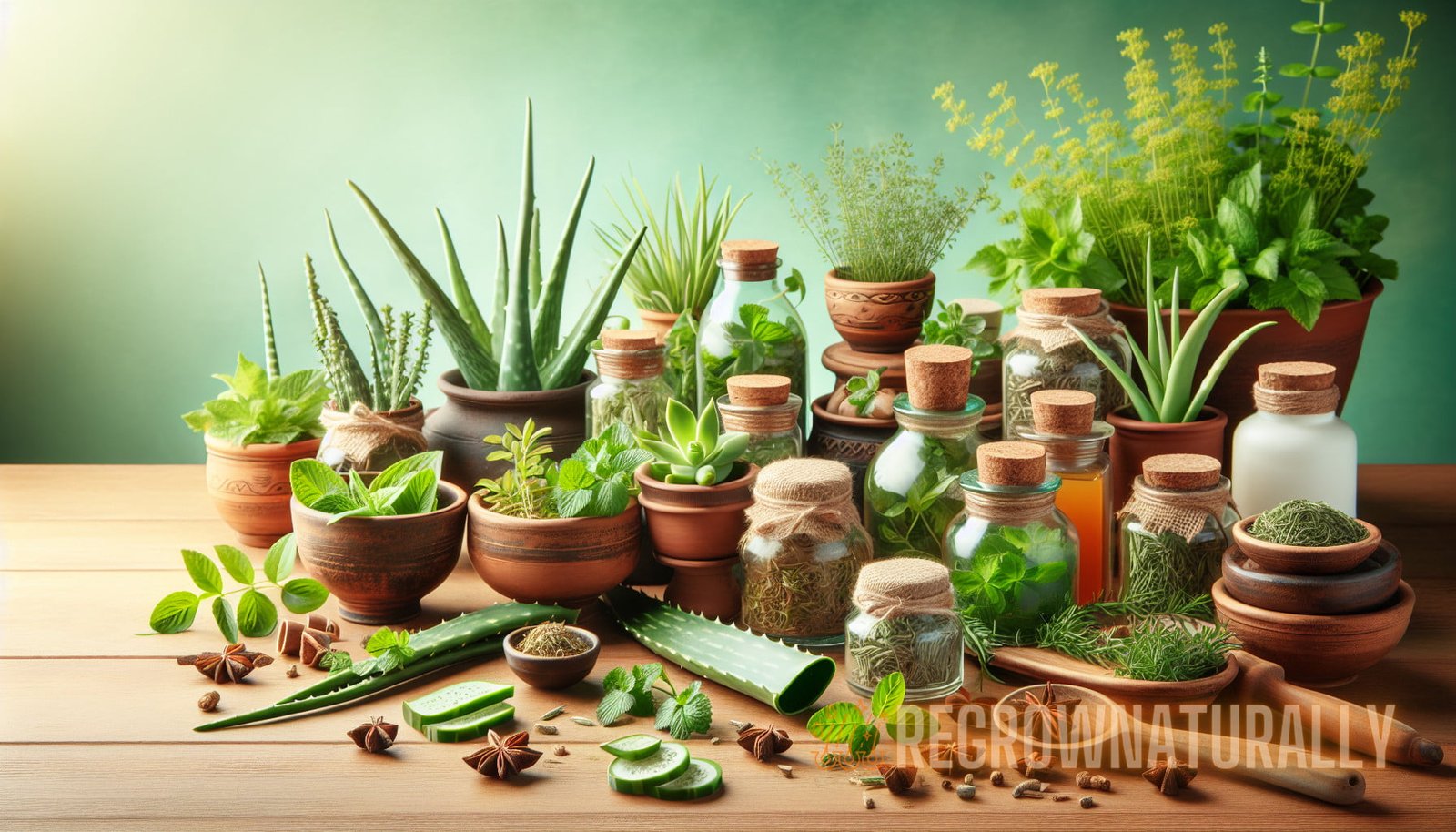Introduction
In today’s fast-paced world, many people are turning to natural remedies to address various health concerns. One area where herbal remedies have gained significant popularity is in hair and scalp revitalization. Herbal revitalization is the use of plant-based ingredients to promote healthier, stronger hair and a nourished scalp. In this guide, we will uncover nature’s secrets and explore the science behind herbal remedies for hair and scalp revitalization.
The Basics of Herbal Revitalization
Herbal revitalization involves using herbs and plant-based ingredients to promote hair growth, prevent hair loss, and improve the overall health of the scalp. The key to understanding the effectiveness of herbal remedies lies in the active compounds present in these plants. Various herbs contain essential vitamins, minerals, and antioxidants that possess specific properties beneficial for hair and scalp health. Let’s delve deeper into some of the most popular herbs and their revitalizing properties.
Rosemary
Rosemary is an herb that has been used for centuries in traditional medicine. It is rich in antioxidants, which help protect the hair and scalp from free radicals, which can damage hair follicles and lead to hair loss. Rosemary also has anti-inflammatory properties, making it an excellent choice for soothing an irritated scalp. Furthermore, rosemary stimulates blood circulation in the scalp, promoting hair growth and preventing premature graying.
Lavender
Lavender is known for its calming scent, but it also offers numerous benefits for hair and scalp revitalization. Lavender oil is believed to stimulate hair growth by increasing the number of hair follicles in the growth phase. It also has antimicrobial properties, which can help combat scalp infections and promote a healthier scalp environment. Additionally, lavender oil has been found to balance natural oil production, making it suitable for both dry and oily scalps.
Peppermint
Peppermint is another herb that has gained popularity in the world of hair and scalp revitalization. It contains menthol, which has a cooling sensation and helps improve blood circulation when applied to the scalp. Increased blood flow to the scalp promotes hair growth by ensuring the hair follicles receive an adequate supply of nutrients. Peppermint oil is also known for its antimicrobial properties, which can help prevent scalp infections and reduce dandruff.
Aloe Vera
Aloe vera is a succulent plant widely known for its soothing and moisturizing properties. When used in hair care, aloe vera can help nourish and hydrate the scalp, reducing dryness and itchiness. It contains enzymes that promote healthy hair growth by unclogging hair follicles, allowing new hair to emerge. Aloe vera also has a cooling effect on the scalp, making it a great choice for individuals with sensitive scalps.
The Science Behind Herbal Remedies

While herbal remedies have been used for centuries, it is essential to understand the scientific basis behind their effectiveness. Research has shown that many herbs possess specific compounds that contribute to their hair and scalp revitalizing properties. Let’s explore some of the scientific evidence supporting the use of herbal remedies for hair and scalp health.
Hair Growth Promotion
One of the primary benefits of herbal remedies is their ability to promote hair growth. Studies have shown that certain plant compounds can inhibit the activity of an enzyme called 5-alpha reductase, which converts testosterone to dihydrotestosterone (DHT). Excessive levels of DHT can lead to hair loss in individuals with a genetic predisposition. By blocking the activity of 5-alpha reductase, herbal remedies help maintain healthy levels of DHT and prevent hair follicle miniaturization.
In addition, some herbs stimulate the dermal papilla cells in the hair follicles, promoting hair growth. These herbs increase the production of growth factors, such as insulin-like growth factor-1 (IGF-1), which play a crucial role in hair follicle development and regeneration. By stimulating the dermal papilla cells, herbal remedies can improve hair follicle function and restore hair growth.
Anti-Inflammatory Effects
Inflammation is a common underlying factor in many hair and scalp conditions. Herbal remedies often possess anti-inflammatory properties, which can help soothe inflammation and reduce its negative impact on hair health. Research has shown that certain plant compounds inhibit the expression of pro-inflammatory cytokines and enzymes, reducing inflammation and protecting hair follicles from damage.
Antioxidant Protection
Antioxidants play a vital role in protecting hair follicles and the scalp from oxidative stress caused by free radicals. Free radicals are highly reactive molecules that can damage the hair follicles, leading to hair loss and impaired hair growth. Herbal remedies rich in antioxidants help neutralize free radicals, preventing their harmful effects and promoting a healthy scalp and hair.
Scalp Health
A healthy scalp forms the foundation for strong and vibrant hair. Herbal remedies can help improve scalp health by addressing common issues such as dryness, dandruff, and microbial imbalances. For example, tea tree oil, derived from the leaves of the Melaleuca alternifolia tree, possesses antimicrobial properties that can help combat scalp infections and reduce dandruff. Additionally, herbs with moisturizing properties can help hydrate and nourish the scalp, preventing dryness and flakiness.
Using Herbal Remedies for Hair and Scalp Revitalization
Now that we understand the science behind herbal remedies, let’s explore how to use them effectively for hair and scalp revitalization.
Choosing the Right Herbal Remedies

When selecting herbal remedies for hair and scalp revitalization, it is crucial to consider your specific needs and hair type. Different herbs offer unique benefits, so choose ones that target your specific concerns. For example, if you have a dry scalp, look for herbs with moisturizing properties like aloe vera or chamomile. If you are experiencing hair thinning or hair loss, consider herbs that promote hair growth, such as rosemary or saw palmetto.
Preparing and Applying Herbal Remedies
Herbal remedies can be prepared in various forms, including oils, extracts, masks, and teas. The method of preparation will depend on the herb and the desired application. Here’s a general guide to preparing and applying herbal remedies:
- Herbal oils: Infuse dried herbs in carrier oils, such as coconut or olive oil, for several weeks. Strain the oil and apply it to the scalp and hair, leaving it on for a few hours or overnight before washing.
- Herbal extracts: Mix herbal powders or dried herbs with a carrier liquid, such as water or apple cider vinegar. Apply the mixture to the scalp and hair, leave it on for a specific duration, and rinse thoroughly.
- Herbal masks: Combine powdered herbs with other ingredients, such as yogurt or honey, to create a thick paste. Apply the mask to the scalp and hair, leave it on for the recommended time, and rinse thoroughly.
- Herbal teas: Brew dried herbs or herbal tea bags in hot water. Allow the tea to cool, then use it as a final rinse after shampooing and conditioning your hair.
Consistency and Patience
Like any natural remedy, herbal revitalization requires consistency and patience. It takes time for the herbs to work their magic and show results. Consistently use your chosen herbal remedies as recommended, and give them time to make a noticeable difference. Results may vary depending on individual factors such as genetics, overall health, and the severity of the hair or scalp condition. Be patient, and with consistent use, you are likely to experience positive changes in your hair and scalp health over time.
Conclusion
Herbal revitalization is a natural and holistic approach to promoting hair and scalp health. By harnessing the power of nature’s secrets, we can address various hair and scalp concerns with effective, plant-based ingredients. The science behind herbal remedies supports their use in promoting hair growth, reducing inflammation, protecting against oxidative stress, and improving overall scalp health. With the right herbal remedies and a consistent routine, you can revitalize your hair and scalp naturally, achieving healthier, stronger, and more beautiful hair.
Internal links
For more information on specific herbal remedies and their benefits, be sure to read our article on botanical secrets. Additionally, if you are interested in learning about natural hair renewal techniques, our article on hair renewal provides valuable insights and tips.
External link
For a comprehensive understanding of herbal medicine, you can refer to the Wikipedia page on herbal medicine. This page offers detailed information on the history, uses, and scientific basis of herbal remedies.



